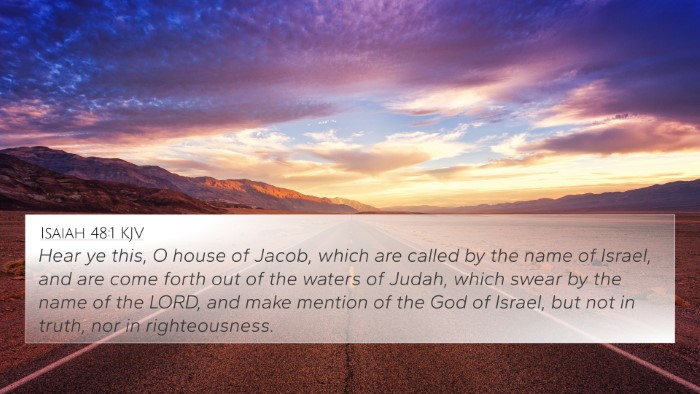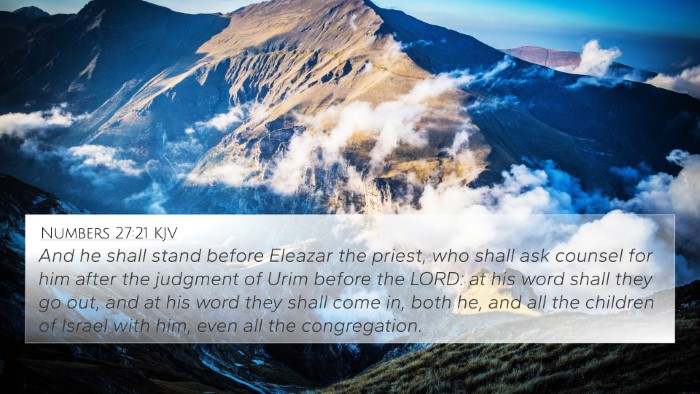Understanding 1 Samuel 14:36
1 Samuel 14:36 presents a significant moment in the narrative of King Saul and his leadership during a period of conflict. In this verse, Saul expresses a desire to pursue the Philistines, demonstrating his concern for Israel's enemies while indicating a lack of divine guidance at the moment. To grasp the full meaning and implications of this verse, we can draw insights from various public domain commentaries.
Verse Context
In the context of 1 Samuel 14, Saul's decision is rooted in previous events where Jonathan, his son, had taken bold action against the Philistines. This chapter illustrates the tension within Saul's leadership and the need for clearer guidance from God.
Commentary Insights
- Matthew Henry:
Matthew Henry emphasizes Saul's impatience and rashness in seeking God only when circumstances escalate. Saul's inquiry to the priest for divine revelation highlights his acknowledgment of the need for God’s presence, yet underscores his inconsistency and lack of spiritual discernment.
- Albert Barnes:
Albert Barnes points out that this verse reveals Saul's character as a leader. He notes the importance of seeking divine direction, contrasting it with the earlier impulsive actions of Jonathan. Barnes suggests that true leadership involves prayerful consideration, and neglecting this leads to failure.
- Adam Clarke:
Adam Clarke interprets this verse as a moment reflecting on the nature of divine guidance. He suggests that Saul’s request for God’s blessing on his plans was not one of genuine submission but of convenience. Clarke also indicates that this moment foreshadows Saul’s eventual downfall due to his complicated relationship with God.
Thematic Connections
This verse and its interpretations can be linked thematically to several important topics throughout Scripture:
- Leadership and Divine Guidance: The narrative reflects on what it means to lead with God’s guidance and the consequences of neglecting spiritual wisdom.
- Human Impulsivity: Saul's rapid decision to pursue conflict without waiting for God's confirmation speaks to human tendencies to act out of fear or urgency.
- Prayer and Inquiry: The dialogue with the priest shows the need for prayer and seeking counsel from God in challenging times.
Bible Verse Cross-References
1 Samuel 14:36 can be connected to several other scriptures that explore similar themes of seeking God’s guidance, leadership, and the consequences of disobedience. Here are key cross-references:
- Proverbs 3:5-6: "Trust in the Lord with all your heart and lean not on your own understanding." This emphasizes the necessity of divine reliance in leadership.
- James 1:5: "If any of you lacks wisdom, let him ask of God." This reflects the importance of seeking God's wisdom, much like Saul needed in this context.
- 1 Samuel 28:6: This verse illustrates the significance of seeking God's counsel, which Saul ultimately failed to do, leading to his demise.
- Psalm 137:1-4: Reflects the struggle of the Israelites during their times of challenge, paralleling the need for guidance in times of trouble.
- 2 Chronicles 7:14: "If my people, who are called by my name, will humble themselves and pray..." echoes Saul's need for humility and divine connection.
- Matthew 7:7: "Ask, and it will be given to you; seek, and you will find..." underscores the principle of seeking God’s input in all aspects of life.
- Isaiah 30:21: "Your ears shall hear a word behind you, saying, 'This is the way, walk in it...'" reinforces the call for divine direction in decision-making.
Conclusion
1 Samuel 14:36 is not merely a historical account but also a profound lesson on the importance of seeking God's direction, especially in leadership. The insights from respected commentaries illuminate the intricate dynamics of Saul’s character and his relationship with divine guidance, offering valuable lessons for contemporary readers considering the choices and challenges of life.
Utilizing tools for Bible cross-referencing, one can explore these connections further, examining how the narratives, themes, and principles found in 1 Samuel resonate with various passages throughout Scripture. This enriches our understanding of not only this specific verse but also the overarching narrative contained within the Bible.















